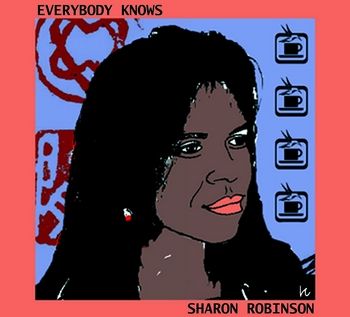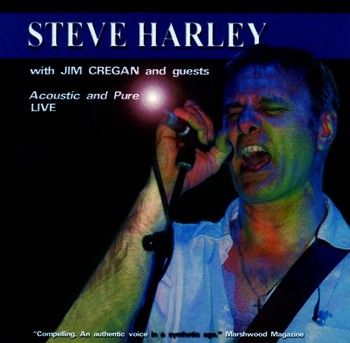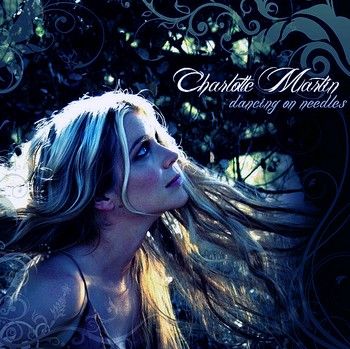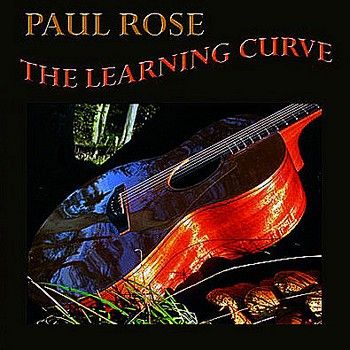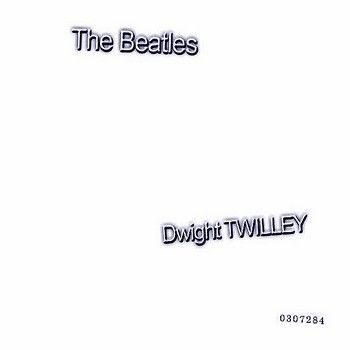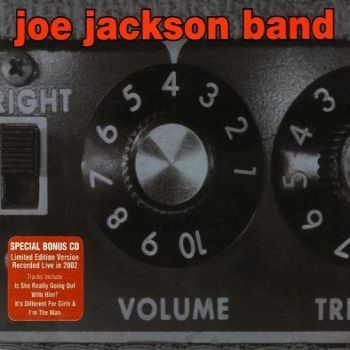
Volume 4 was an album released in 2003 by British musician Joe Jackson. It was the first album to feature the Joe Jackson Band since the 1980 release, Beat Crazy, and it was Jackson's first rock 'n' roll album since Laughter and Lust, which was released in 1991. As before, the Joe Jackson Band consisted of Jackson, Graham Maby, David Houghton and Gary Sanford. It was released to moderately positive reviews. Rolling Stone rated it 3/5, stating that it was less visceral than his early-1980s music, but that "when it comes to edgy, sensitive-guy rock, he proves on Volume 4 that he still is the man." AllMusic rated it 3.5/5, stating that "Volume 4 isn't as lively or vital as his first five albums, but it's also more satisfying as a pop record than anything he's done since Body & Soul, which is more than enough to make it a worthy comeback.” The album was followed by a lengthy tour. - Wikipedia
Twenty-five years after his pissed-off debut, Look Sharp!, Joe Jackson has reassembled his original band and put aside his jazz-composer aspirations, for the moment. Emotionally, not much has changed for Jackson: He is still disgusted by the world and still standing around watching the pretty women pass by him with the gorillas, as in "Awkward Age," when he complains that now "I get into the parties/But I hate them 'cause I'm shy."Volume 4 is certainly more crafty and less visceral than Jackson's early-Eighties music, but that doesn't mean it is less rewarding. On songs such as "Bright Grey" and the poignant "Chrome," Jackson's added sophistication pays off by replacing adolescent self-pity with nuance. Only on the petty "Thugs 'r' Us" -- a too obvious dig at suburban wanna-be's who irritate old Joe with their dang "Snoop and Dre" -- does Jackson misfire completely and come off as merely cranky. Jackson may have gone from angry young man to bitter old man, but when it comes to edgy, sensitive-guy rock, he proves on Volume 4 that he still is the man. © RICHARD ABOWITZ (From RS 920, April 17, 2003) © 2009 Rolling Stone http://web.archive.org/web/20090715045353/http://www.rollingstone.com/artists/joejackson/albums/album/272398/review/5944847/volume_4
It only took two albums before Joe Jackson got restless, pushing away from the nervy, high-octane, well-crafted punk-pop of Look Sharp! and I'm the Man toward the ska leanings of Beat Crazy, before abandoning the Joe Jackson Bandaltogether. Without them, he roamed wild, laying the groundwork for neo-swing with Jumpin' Jive and etching out sophisti-pop on his Cole Porter/George Gershwin-flavored Night and Day, before expanding into symphonic compositions and other increasingly esoteric stylistic exercises, whittling his audience down to just the dedicated in the process. Even among those dedicated fans, the first two Jackson albums were cherished, and Jackson acknowledged that on occasion by appropriating the sound, as on 1991's Laughter & Lust. Still, it took him a full 23 years to reunite his original band, an event celebrated by the release of Volume 4 (the title indicating that this is the fourth go-round for this band, kind of like how Van Halen III kicked off the third incarnation of the band). It would be inaccurate to say that this captures the bristling energy or spitting vitriol of the first two records, though Volume 4 certainly follows a similar template and often feels similar in form, if not in substance, to that pair. It also recalls Night and Day in parts (ironically, moreso than the explicit 2000 sequel Night and Day II), which means it winds up being a revival of the classic Joe Jackson sound instead of the Joe Jackson Band. Frankly, that's not a problem; if this is going to be a nostalgia exercise, at least in part, it should be about the overarching idea of Jackson as much as the particulars. Plus, it's a good record -- his best pure pop in at least a decade. It's a little front-loaded and, at times, it may seem a little labored or self-conscious, but usually it sounds relaxed and tuneful, as if Jackson is relieved to just be cutting a record of pop tunes instead of worrying about a grand concept or symphonic movements. And while the band certainly has mellowed with age, they still bring his music to life better than any other outfit he's worked with, giving it definition and muscle. It may be true that Volume 4 isn't as lively or vital as his first five albums, but it's also more satisfying as a pop record than anything he's done since Body & Soul, which is more than enough to make it a worthy comeback. © Stephen Thomas Erlewine © 2014 AllMusic, a division of All Media Network, LLC. | All Rights Reserved http://www.allmusic.com/album/volume-4-mw0000022950
What could have been a colossal self-indulgence proves a startlingly vital album. Volume IV is faithful to the ethos of early Joe Jackson hits like "One More Time" and "Is She Really Going Out with Him?" Built around clattering drums, jarring guitar, hyperactive keyboards, snarling vocals, and lyrics riddled with puns and double-entendres, it harkens back to the early 1970s and late ‘80s, when Jackson peddled a wordy and venomous strain of new wave pop. But Jackson is too clever to get suckered by nostalgia. Here he wryly contemplates his middle-aged present from inside his old clothes. The best of the resulting songs, "Blue Flame" and "Still Alive," are as good as anything he’s done. Volume IV is where Jackson completes his circuit, reuniting with his original band and reacquainting himself with his original live-to-tape recording methods. © Andrew Mueller © 1996-2014, Amazon.com, Inc. or its affiliates http://www.amazon.com/Volume-4-Joe-Band-Jackson/dp/B00008J2F7
The ridiculously talented songwriter and musician Joe Jackson has a reputation for being a grumpy and difficult artist. However, any musician who can write and play like Joe can easily be forgiven for their idiosyncrasies . Yours truly forgave Don Fagen many moons ago! LOL. This double CD album is an excellent mix of old favourites and new songs played by a musical genius backed by three very accomplished musicians. Listen to the superb bass work of Graham Maby. This limited edition CD includes a bonus live CD recorded at the Wedgewood Rooms, Portsmouth, England on the 23rd/24th September and the Marquee, London on Sept 26th 2002. The album is HR by A.O.O.F.C. Listen to Joe’s classic “Night And Day” album [All tracks @ 320 Kbps: File size = 161 Mb]
TRACKS CD 1
Take It Like a Man – 3:24
Still Alive – 3:42
Awkward Age – 3:22
Chrome – 4:21
Love at First Light – 4:08
Fairy Dust – 3:47
Little Bit Stupid – 3:28
Blue Flame – 5:23
Dirty Martini – 4:51
Thugz 'R' Us – 3:23
Bright Grey – 4:17
TRACKS CD 2
One More Time [live] – 3:15
Is She Really Going Out with Him? [live] – 4:12
On Your Radio [live] – 5:15
Got the Time [live] – 3:47
It's Different for Girls [live] – 4:15
I'm the Man [live] – 4:21
All songs composed by Joe Jackson
MUSICIANS
Joe Jackson – Organ, Piano, Electric Piano, Melodica, Vocals
Gary Sanford – Guitar, Backing Vocals
Graham Maby – Bass, Backing Vocals
David Houghton – Drums, Backing Vocals
BIO
In his 1999 memoir, A Cure for Gravity: A Musical Pilgrimage, Joe Jackson writes approvingly of George Gershwin as a musician who kept one foot in the popular and one in the classical realms of music. Like Gershwin, Jackson possesses a restless musical imagination that has found him straddling musical genres unapologetically, disinclined to pick one style and stick to it. The word "chameleon" often crops up in descriptions of him, but Jackson prefers to be thought of as "eclectic." Is he the Joe Jackson he appeared to be upon his popular emergence in 1979, a new wave singer/songwriter with a belligerent attitude derisively asking, "Is She Really Going Out with Him?" The reggae-influenced Joe Jackson of 1980's Beat Crazy? The jump blues revivalist of 1981's Joe Jackson's Jumpin' Jive? The New York salsa-styled singer of 1982's "Steppin' Out"? The R&B/jazz-inflected Jackson of 1984's Body & Soul? Or is he David Ian Jackson, L.R.A.M. (Licentiate of the Royal Academy of Music), who composes and conducts instrumental albums of contemporary classical music such as 1987's Will Power and 1999's Grammy-winning Symphony No. 1? He is all of these, Jackson himself no doubt would reply, and a few others besides. The roots of that eclecticism lie in the conflicts of his youth. He was born David Ian Jackson on August 11, 1954 (not 1955, as some references mistakenly state) in Burton-upon-Trent, Staffordshire, England. His parents had met when his father was in the Navy and his mother was working in her family's pub in Portsmouth on the south coast of England. They initially settled in his father's hometown, Swadlincote, on the border of Staffordshire and Derbyshire, but when Jackson was a year old, they moved back to his mother's hometown, and he was raised in Portsmouth and nearby Gosport. His father, Ronald Jackson, became a plasterer. Growing up in working-class poverty, Jackson was a sickly child, afflicted with asthma, first diagnosed when he was three and producing attacks that lasted into his twenties. Prevented from playing sports, he turned to books and eventually music. At 11, he began taking violin lessons, later studying timpani and oboe at school. His parents got him a secondhand piano when he was in his early teens, and he began taking lessons, soon deciding that he wanted to be a composer when he grew up. He played percussion in a citywide student orchestra. But his social milieu was more accepting of different forms of popular music than it was of the classics, and he developed a taste for that, too. Becoming interested in jazz, he formed a trio and, at the age of 16, began playing piano in a pub, his first professional gig. By the early '70s, Jackson, who had paid little attention to rock before, became a fan of progressive rock, notably such British groups as Soft Machine. Meanwhile, in 1972, he passed an advanced "S" level exam in music that entitled him to a grant to study music, and he was accepted at the Royal Academy of Music in London. Rather than moving to the city, he spent his grant money on equipment and commuted several days a week to attend classes while continuing to live at home and play pop music locally. He switched from writing classical compositions to pop songs. Invited to join an established band called the Misty Set, he sang his first lead vocal on-stage. He moved to another established band called Edward Bear (the name taken from a character in Winnie the Pooh, not to be confused with the Canadian band of the same name that recorded for Capitol Records in the early '70s). Deciding that he resembled the title character on a television puppet show called Joe 90, his bandmates began calling him "Joe," and it stuck. After six months, the two principals in Edward Bear decided to retire from music, and with their permission he took over the name and the group's bookings and brought in a couple of his friends, lead singer/guitarist Mark Andrews (later of Mark Andrews & the Gents) and bassist Graham Maby. Jackson continued to attend the Royal Academy, where he studied composition, orchestration, and piano while majoring in percussion. He also occasionally played piano in the National Youth Jazz Orchestra. He graduated from the academy after three years in 1975. By then, Edward Bear (forced to change its name to Edwin Bear because of the more successful Canadian band, and then to Arms & Legs) were attracting more attention and acquired management, which in turn signed the band to MAM Records. In April 1976, MAM released the first Arms & Legs single, with Andrews' "Janie" on the A-side and Jackson's "She'll Surprise You" on the B-side. Second and third singles followed in August and February 1977, but the records did not sell. Meanwhile, in October 1976, Jackson quit the band to become pianist and musical director at the Playboy Club in Portsmouth. He was determined to save enough money to record his own album and release it himself. In August 1977, he played his first gigs as the leader of the Joe Jackson Band, singing and playing keyboards, backed by Andrews (sitting in temporarily and soon replaced by Gary Sanford), Maby, and drummer Dave Houghton. At the same time, he quit the Playboy Club job to become pianist/musical director for a cabaret act, Koffee 'n' Kream, that was beginning a national tour in the wake of their triumph on the TV amateur show Opportunity Knocks. Jackson toured with Koffee 'n' Kream from the fall of 1977 to the spring of 1978, and the money he made enabled him to move to London in January 1978 and continue recording his album in a Portsmouth studio. He began shopping demo tapes to record labels in London without success until he was heard by American producer David Kershenbaum. Kershenbaum was scouting for talent on behalf of A&M Records, and he arranged for Jackson to be signed to A&M on August 9, 1978, after which they immediately re-recorded Jackson's album. They completed it quickly, and at the end of the month the Joe Jackson Band embarked on an extensive national tour. Despite his classical education and background playing many types of pop music in pubs and clubs, Jackson had become genuinely enamored of the punk/new wave movement of the late '70s in England, especially attracted by the energy and simplicity of the music and the angry, aggressive tone of the lyrics. He had no trouble incorporating these elements into his own music, and if he was, to an extent, using the new wave label as a flag of convenience, the style nevertheless was a valid vehicle of expression for him. Of course, first impressions can be lasting, and to many people he would, ever after, be an angry new wave singer/songwriter, no matter what else he did. In October 1978, A&M released the first Joe Jackson single, "Is She Really Going Out with Him?," a rhythmic ballad in which the singer ponders why "pretty women" are attracted to "gorillas" and worries about his own inadequacy. The record failed to chart, but Jackson and his band continued to tour around the U.K. and began to attract press attention. Look Sharp!, his debut album, followed in January 1979, again, to no significant sales at first. The LP contained more songs in the vein of "Is She Really Going Out with Him?," many of them uptempo rockers with strong melodies and lyrics full of romantic disappointment and social criticism, bitterly expressed and with more than a touch of self-deprecation. (One, "Got the Time," was sufficiently raucous to be covered by heavy metal band Anthrax in essentially the same arrangement on their Persistence of Time album in 1990.) A&M released "Sunday Papers," an attack on the salaciousness of tabloid newspapers, as a single in February, again without reaction. But in March, Look Sharp! finally broke into the charts, eventually peaking at the bottom of the Top 40. The same month, A&M released the album in the U.S., and it quickly charted, reaching the Top 20 after "Is She Really Going Out with Him?" was released as a single in May (while Jackson toured North America) and became a Top 40 hit; in September, the LP was certified gold in the U.S. In the U.K., "Is She Really Going Out with Him?" was re-released in July and charted in August, making the Top 20. Jackson was nominated for a 1979 Grammy Award for Best Rock Vocal Performance, Male, for the single. Meanwhile, Jackson toured more or less continually, playing dates in Continental Europe in June and then back in the U.K. through August before returning to North America. But he had found the time and inspiration to craft a quick follow-up to Look Sharp!, and his second LP, I'm the Man, was released on October 5. That was a little too soon for the U.S. market, where Look Sharp! had not yet exhausted its run, and while the album made the Top 40, it was a relative sales disappointment, with the single "It's Different for Girls" failing to enter the Hot 100. The story was different in the U.K., however, where I'm the Man made the Top 20 and "It's Different for Girls" reached the Top Five. Critically, the album was considered a continuation of Look Sharp!, an opinion shared by Jackson himself. The first blush of his emergence fading, Jackson was beginning to be viewed by critics as the third in a line of angry British singer/songwriters starting with Graham Parker and continuing with Elvis Costello, and his commercial success created resentment, especially because he was not as forthcoming with the media as the garrulous Costello. The U.S. tour ran into November, followed by more shows in the U.K. in November and December. Jackson went back on the road in February 1980 with a few U.S. dates, followed by some U.K. shows and a European tour that ran from March to May. Like other punk/new wave acts, he had used reggae rhythms on occasion, notably on "Fools in Love" on Look Sharp! and "Geraldine and John" on I'm the Man. In May, he released an EP in the U.K. including a cover of Jimmy Cliff's "The Harder They Come." In acknowledgment of his group's importance to his sound, the disc was billed to the Joe Jackson Band. After dates in the U.K. in May and June, the Joe Jackson Band returned to North America for a tour that lasted into August; they finally took a break after a few more shows at the end of the month. Beat Crazy, released in October, also was billed to the Joe Jackson Band. The album featured less of the frantic punk sound of its predecessors, instead absorbing the dub-reggae and ska influences that were topping the British charts just then in the music of bands like the Specials and the English Beat. But it was a relative disappointment commercially, peaking in the 40s in both the U.S. and U.K., with its singles failing to chart. One reason for the reduced sales in America may have been that the group did not tour to support it there. the Joe Jackson Band played a monthlong tour from October to November in the U.K., followed by a month in Europe from November to December, after which it split up, according to Jackson because Houghton no longer wanted to tour. Sanford became a session musician, while Maby stuck with Jackson. Jackson, in ill health following more than two years of continual touring, retreated to his family home, where he became increasingly immersed in the jump blues of 1940s star Louis Jordan. He organized a new band in the style of Jordan's Tympany 5 featuring three horn players (Pete Thomas on alto saxophone, Raul Oliveria on trumpet, and David Bitelli on tenor saxophone and clarinet) along with pianist Nick Weldon and drummer Larry Tolfree, plus Maby and Jackson himself, who played vibes and sang. The group, dubbed Joe Jackson's Jumpin' Jive, played a collection of swing and jump blues standards such as "Jumpin' with Symphony Sid," "Is You Is or Is You Ain't My Baby," and "Tuxedo Junction." The resulting Joe Jackson's Jumpin' Jive LP, released in June 1981, was a hit in Britain, where it reached the Top 20. In the U.S., the album was not so much 35 years behind the times as 15 years ahead of them; had it appeared in the mid-'90s, it would have fit right in with releases by the Brian Setzer Orchestra and Big Bad Voodoo Daddy as part of the neo-swing movement. As it was, America circa 1981 was baffled, but Jackson's core audience was sufficiently curious to push the album into the Top 50 while he toured the country with the band in July in between British dates in June and from August to September. Jackson went through more personal changes over the next year. He and his wife divorced, and he moved to New York City, where, true to form, he began to immerse himself in new musical genres, particularly attracted to salsa and the classic songwriting styles of Gershwin and Cole Porter. The result was Night and Day, released in June 1982, Jackson's first album to put his keyboard playing at the center of his music, with percussionist Sue Hadjopoulas also given prominence. Jackson seemed to have abandoned new wave rock for a catchy pop-jazz-salsa-dance hybrid, and he backed the release with a yearlong world tour as A&M put considerable promotional muscle behind the LP. "Steppin' Out" became a multi-format hit, earning airplay on album-oriented rock (AOR) radio before spreading to the pop and adult contemporary charts, placing in the Top Ten all around and eventually earning Grammy nominations for Record of the Year and Best Pop Vocal Performance, Male. With that stimulus, the album reached the Top Ten and went gold, spawning a second Top 20 single in "Breaking Us in Two." Jackson finished the Night and Day tour in May 1983. He had been asked to contribute a song to Mike's Murder, a film written and directed by James Bridges (The China Syndrome, Urban Cowboy) and starring Debra Winger (Urban Cowboy, An Officer and a Gentleman). He ended up writing both a handful of songs and a few instrumental pieces that were released on a soundtrack album in September. Unfortunately, the film itself was not ready for release then, since it was the subject of a dispute between Bridges and the movie studio that had financed it, the result being reshooting and re-editing, such that the film did not open until March 1984, by which time it had a score by John Barry and only a little of Jackson's music remaining, and then it earned only one million dollars during a few weeks of theatrical showings, making it a disastrous flop. The orphaned soundtrack album, however, managed to get into the Top 100 and even spawned a chart single in the Jackson composition "Memphis," while "Breakdown" earned a Grammy nomination for Best Pop Instrumental Performance. Jackson returned to the studio and emerged in March 1984 with Body & Soul, an album with a cover photograph showing him clutching a saxophone in the style of the 1950s LP covers of Blue Note Records. The disc inside was a follow-up to Night and Day in style, however, with a bit more of an R&B tilt, and it was another commercial success, if a more modest one, reaching the Top 20 and spawning a Top 20 single in "You Can't Get What You Want (Till You Know What You Want)." After the four-month Body & Soul world tour concluded in July 1984, Jackson retreated. The tour had been, he later wrote, "the hardest I ever did; it came too soon after the last one, and by the end of it I was so burned out I swore I'd never tour again." He re-emerged after 18 months in January 1986 for a series of live recording sessions at the Roundabout Theatre in New York conducted for his next album. Audiences were invited to attend, but instructed to hold their applause as the performances were cut direct to a two-track tape recorder. The resulting album, Big World, released in March, had a one-hour running time, making it an ideal length for the new CD format, though it had to be pressed on two LPs with the second side of the second LP left blank. Press reaction to these two aspects of the album tended to overshadow consideration of the material, which ranged from politically charged rockers like "Right or Wrong," a direct challenge to the Reagan administration, to heartfelt ballads like "Home Town," a reflection on memory and loss. Jackson undertook another extensive tour lasting from May to December (one he reported enjoying much more than the last one), and the album spent six months in the charts, but only peaked in the Top 40. In the winter of 1985, Jackson had been commissioned to write a 20-minute score for a Japanese film, Shijin No Ie (House of the Poet), and the orchestral piece was recorded with the Tokyo Symphony Orchestra. He adapted it into "Symphony in One Movement" and added a few other instrumental pieces to create his next album, Will Power, his first disc to reflect his classical background. A&M gave the LP a surprising promotional push that included releasing the title track as a single, and Jackson fans were sufficiently intrigued to push the album into the lower reaches of the pop chart upon its release in April 1987. But his increasing desire to include classical elements in his popular work and to issue outright "serious" compositions tended to put him in a no man's land where reviewers were concerned, since rock critics were for the most part incapable of judging such works and preferred that he stick to rock-based music, while classical critics simply ignored him. Had they been paying attention, however, they might not have approved of what they heard, anyway. An unrepentant Beethoven fan, Jackson had disliked his exposure to serial music and other contemporary trends in classical music when he encountered them in college; his serious compositions tended to reflect his taste for conventional concert music of the romantic and classical periods. While staying off the road, Jackson had two albums in release in 1988. In May, he issued the double-disc set Live 1980/86, chronicling his tours over the years. It reached the Top 100. In August came his swing-styled soundtrack to the Francis Ford Coppola film Tucker: The Man and His Dream, an effort that probably would have attracted more attention if the film had been more successful (it grossed less than $20 million). Nevertheless, the album earned a Grammy nomination for Best Album of Original Instrumental Background Score Written for a Motion Picture or TV. His next LP, released in April 1989, was Blaze of Glory, another modest seller with a peak only in the Top 100 despite radio play for the single "Nineteen Forever." Jackson, who felt the album was one of his best efforts and toured to support it with an 11-piece band in the U.S. and Europe from June to November, was disappointed with both the commercial reaction and his record company's lack of support. He parted ways with A&M, which promptly released the 1990 compilation Steppin' Out: The Very Best of Joe Jackson, a Top Ten hit in the U.K. Jackson wrote his third movie score for 1991's Queens Logic; no soundtrack album was issued. Signing to Virgin Records, he released his next album, Laughter & Lust, in April 1991. Here, he expressed some of his frustration with the record business in the appropriately catchy, '60s-styled "Hit Single," while the socially conscious "Obvious Song" and a percussion-filled cover of Fleetwood Mac's "Oh Well" attracted radio attention. But the album continued his gradual sales decline, failing to reach the Top 100 in the U.S. Another world tour stretched from May to September, after which Jackson was not heard from on record for three years. In the interim, he wrote music for two movies, the interactive film I'm Your Man (1992) and the feature Three of Hearts (1993), neither of which produced soundtrack albums featuring his music. He reappeared in record stores in October 1994 with Night Music, a low-key album that attempted to fuse his pop and classical styles, including instrumentals and guest vocals by Máire Brennan of Clannad. The album, which did not chart, was supported with a world tour that ran from November to May 1995. After it, Jackson left Virgin and signed to Sony Classical, a label more accepting of his musical ambitions. In September 1997, it released Heaven & Hell, a song cycle depicting the seven deadly sins, billed to Joe Jackson & Friends; the friends included such guest vocalists as folk-pop singers Jane Siberry and Suzanne Vega and opera singer Dawn Upshaw. The album reached number three in Billboard's Classical Crossover chart. A tour ran from November to April 1998. Jackson worked on two projects in the late '90s, both of which appeared in October 1999. Sony Classical issued his Symphony No. 1, which was played not by an orchestra, but by a band of jazz and rock musicians including guitarist Steve Vai and trumpeter Terence Blanchard, and it won the 2000 Grammy Award for Best Pop Instrumental Album. And publishers PublicAffairs came out with Jackson's book, A Cure for Gravity: A Musical Pilgrimage, in which he wrote about his love of all kinds of music and recounted his life from his birth up to the point of his emergence as a public figure in the late '70s. Bringing his story up to date, he wrote, "So I'm still making music, no longer a pop star -- if I ever really was -- but just a composer, which is what I wanted to be in the first place." Having released only semi-classical works on his last three recordings, Jackson was thought to have abandoned pop/rock music completely, but that proved not to be true. The early years of the 21st century found him in a flurry of activity, much of it returning him to the pop music realm. In June 2000, Sony Classical, through Jackson's imprint, Manticore, issued Summer in the City: Live in New York, an album drawn from an August 1999 concert that featured him playing piano and singing, backed only by Maby and drummer Gary Burke, performing some of his old songs along with covers of tunes by the Lovin' Spoonful, Duke Ellington, and the Beatles, among others. Four months later came Night and Day II, a new set of songs in the spirit of his most popular recording. Touring to promote the album in Europe and North America from November to April 2001, Jackson recorded the concert CD Two Rainy Nights: Live in the Northwest (The Official Bootleg), released in January 2002 on his own Great Big Island label through his website, www.joejackson.com. (The album was reissued to retail by Koch in 2004.) Later in 2002, Jackson surprised longtime fans by reuniting with the original members of the Joe Jackson Band, Graham Maby, Gary Sanford, and Dave Houghton, to record a new studio album, Volume 4 © Stephen Thomas Erlewine © 2013 Rovi Corp | All Rights Reserved




